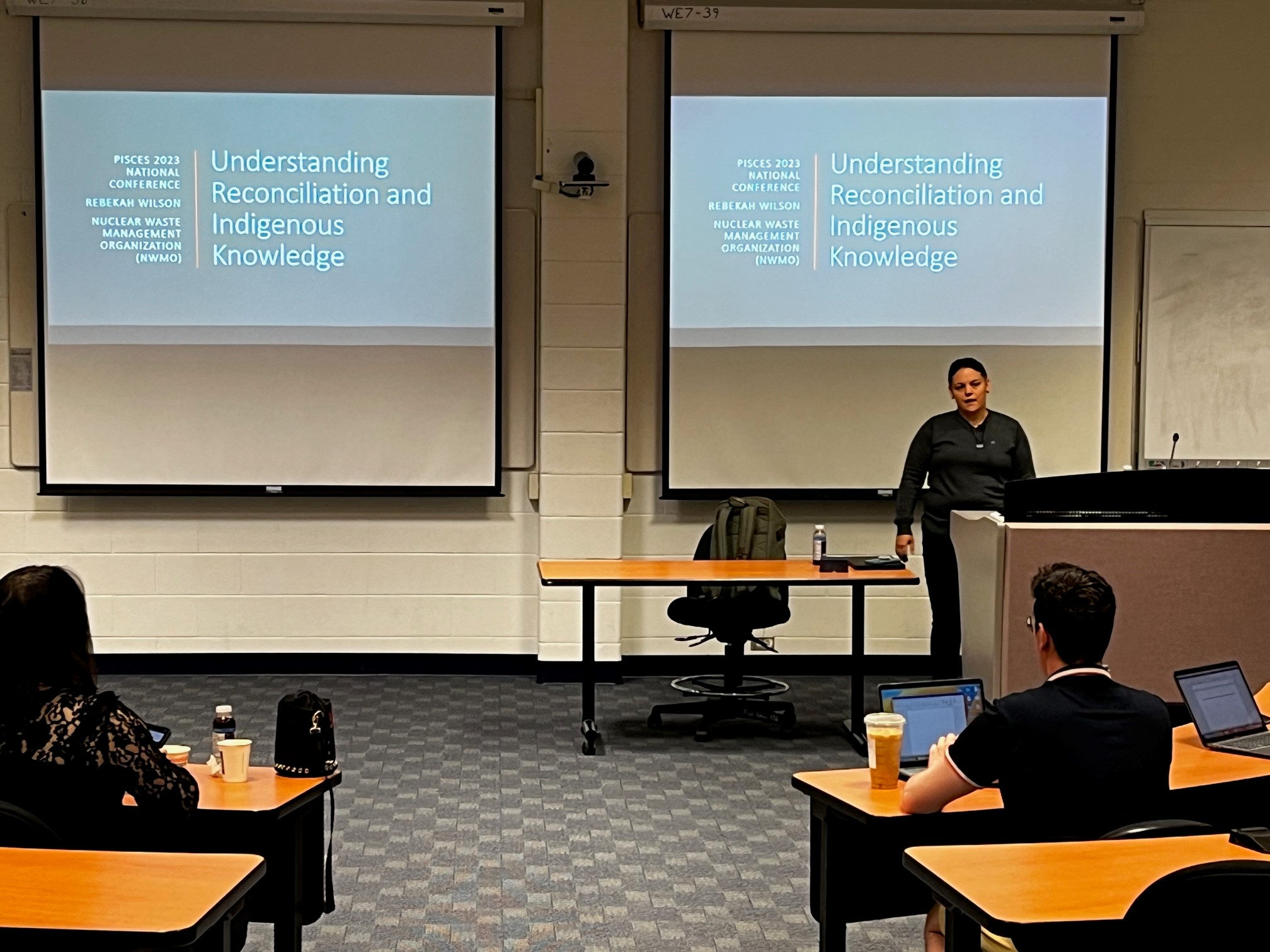The Nuclear Waste Management Organization (NWMO) recently continued its partnership with the University of Guelph on Environmental DNA (eDNA) research by aligning the application of Indigenous Knowledge and Western Science at an important international conference in June.
The Pathway to Increase Standards and Competency of eDNA Surveys (PISCeS) conference is a forum where academia, regulators, industry, civil service organizations, and Indigenous participants came together to explore and inform public policy, industry strategies and future research in the field of eDNA. The research and application of eDNA studies presented at the conference will continue to inform the NWMO biodiversity studies and water protection actions relating to Canada’s Plan for used nuclear fuel.
“The use of environmental DNA in biodiversity studies is emerging as a powerful tool to inform conservation decisions that can help protect the environment,” said Melissa Mayhew, Senior Environmental Scientist who is leading the NWMO eDNA program in collaboration with the University of Guelph. “We are proud to be leading the way in establishing standards of practice that translate data into knowledge that will inform how large infrastructure projects are designed and implemented in Canada.”
The NWMO and its biodiversity consultants along with the University of Guelph contributors hosted a half-day workshop at the conference detailing how we are undertaking the largest freshwater eDNA study in the world.
By applying statistical power to the NWMO biodiversity program study design and managing quality at each stage of the analytical process, we are generating data that builds understanding of how the local aquatic ecosystems are functioning in the potential siting areas for Canada's deep geologic repository for used nuclear fuel.
Along with the workshop, Bob Watts, NWMO Vice President of Indigenous Relations and Strategic Programs, delivered a keynote address at the conference about “Indigenous Perspectives on Risk.” Rebekah Wilson, NWMO Reconciliation Coordinator, also facilitated a workshop on “Understanding Reconciliation and Indigenous Knowledge” to help Western Scientists ask themselves “How can my research contribute to Reconciliation?”
“Through conversations we’ve had with Elders in our joint research program with the NWMO, I’ve been exposed to new ways of knowing and thinking about the land,” said Dr. Bob Hanner, a professor of Integrated Biology at the University of Guelph and one of the NWMO’s water stewards. “We’re working in partnership with NWMO to create spaces for Indigenous youth to participate and become recognized leaders in Integrative Biology aligning their Indigenous Knowledge and relationship with the natural world with cutting-edge molecular biology techniques.”
The Pathway to Increase Standards and Competency of eDNA Surveys (PISCeS) conference is a forum where academia, regulators, industry, civil service organizations, and Indigenous participants came together to explore and inform public policy, industry strategies and future research in the field of eDNA. The research and application of eDNA studies presented at the conference will continue to inform the NWMO biodiversity studies and water protection actions relating to Canada’s Plan for used nuclear fuel.
“The use of environmental DNA in biodiversity studies is emerging as a powerful tool to inform conservation decisions that can help protect the environment,” said Melissa Mayhew, Senior Environmental Scientist who is leading the NWMO eDNA program in collaboration with the University of Guelph. “We are proud to be leading the way in establishing standards of practice that translate data into knowledge that will inform how large infrastructure projects are designed and implemented in Canada.”
The NWMO and its biodiversity consultants along with the University of Guelph contributors hosted a half-day workshop at the conference detailing how we are undertaking the largest freshwater eDNA study in the world.
By applying statistical power to the NWMO biodiversity program study design and managing quality at each stage of the analytical process, we are generating data that builds understanding of how the local aquatic ecosystems are functioning in the potential siting areas for Canada's deep geologic repository for used nuclear fuel.
Along with the workshop, Bob Watts, NWMO Vice President of Indigenous Relations and Strategic Programs, delivered a keynote address at the conference about “Indigenous Perspectives on Risk.” Rebekah Wilson, NWMO Reconciliation Coordinator, also facilitated a workshop on “Understanding Reconciliation and Indigenous Knowledge” to help Western Scientists ask themselves “How can my research contribute to Reconciliation?”
“Through conversations we’ve had with Elders in our joint research program with the NWMO, I’ve been exposed to new ways of knowing and thinking about the land,” said Dr. Bob Hanner, a professor of Integrated Biology at the University of Guelph and one of the NWMO’s water stewards. “We’re working in partnership with NWMO to create spaces for Indigenous youth to participate and become recognized leaders in Integrative Biology aligning their Indigenous Knowledge and relationship with the natural world with cutting-edge molecular biology techniques.”

